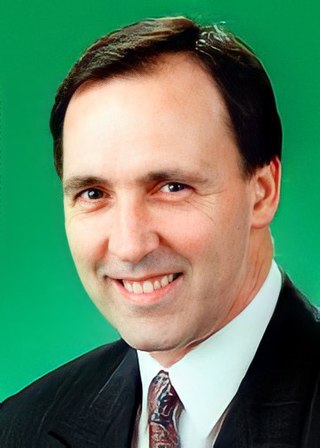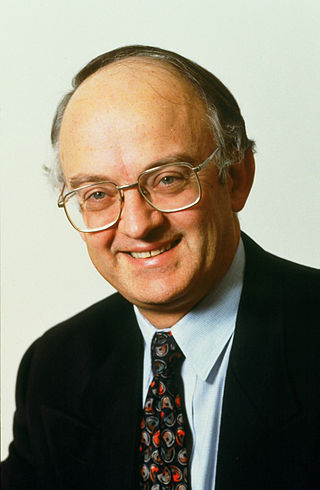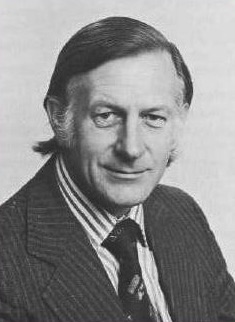
Robert James Lee Hawke was an Australian politician and trade unionist who served as the 23rd prime minister of Australia from 1983 to 1991. He held office as the leader of the Australian Labor Party (ALP), having previously served as the president of the Australian Council of Trade Unions from 1969 to 1980 and president of the Labor Party national executive from 1973 to 1978.

Paul John Keating is an Australian former politician who served as the 24th prime minister of Australia from 1991 to 1996, holding office as the leader of the Labor Party (ALP). He previously served as treasurer under Prime Minister Bob Hawke from 1983 to 1991 and as the seventh deputy prime minister from 1990 to 1991.

Simon Findlay Crean was an Australian politician and trade unionist. He was the leader of the Australian Labor Party (ALP) and leader of the opposition from 2001 to 2003. He represented the seat of Hotham in the House of Representatives from 1990 to 2013 and was a cabinet minister in the Hawke, Keating, Rudd and Gillard governments.

William George Hayden was an Australian politician who served as the 21st governor-general of Australia from 1989 to 1996. He was Leader of the Labor Party and Leader of the Opposition from 1977 to 1983, and served as Minister for Foreign Affairs and Trade from 1983 to 1988 under Bob Hawke and as Treasurer of Australia in 1975 under Gough Whitlam.

Robert Francis McMullan is a former Australian politician. A member of the Australian Labor Party (ALP), he was a cabinet minister in the Keating government as Minister for Arts and Administrative Services (1993–1994) and Minister for Trade (1994–1996). He was a member of federal parliament for over 22 years, initially as a Senator for the Australian Capital Territory from 1988 to 1996 and then as a member of the House of Representatives from 1996 to 2010. Prior to entering parliament he was state secretary of the ALP in Western Australia from 1975 to 1981 and national secretary from 1981 to 1988.

Ralph Willis AO is an Australian former politician who served as a Cabinet Minister during the entirety of the Hawke-Keating government from 1983 to 1996, most notably as Treasurer of Australia from 1993 to 1996 and briefly in 1991. He also served as Minister for Industrial Relations, Minister for Transport and Communications and Minister for Finance. He represented the Victorian seat of Gellibrand in the House of Representatives from 1972 to 1998.

The 1983 Australian federal election was held in Australia on 5 March 1983. All 125 seats in the House of Representatives and all 64 seats in the Senate were up for election, following a double dissolution. The incumbent Coalition government which had been in power since 1975, led by Malcolm Fraser and Doug Anthony, was defeated in a landslide by the opposition Labor Party led by Bob Hawke.

Peter Frederick Morris is an Australian former politician. He held senior ministerial office in the Hawke government, serving as Minister for Transport (1983–1987), Aviation (1984–1987), Resources (1987–1988), Transport and Communications Support (1988), and Industrial Relations (1988–1990). He was a member of the House of Representatives from 1972 to 1998, representing the seat of Shortland for the Australian Labor Party (ALP). His brother Allan and son Matthew were also members of parliament.

Robert Ian Viner is an Australian barrister and politician. He was a member of the House of Representatives from 1972 to 1983, representing the Liberal Party, and held senior ministerial office in the Fraser government.

The Hawke government was the federal executive government of Australia led by Prime Minister Bob Hawke of the Australian Labor Party (ALP) from 1983 to 1991. The government followed the Liberal-National Coalition Fraser government and was succeeded by another Labor administration, the Keating government, led by Paul Keating after an internal party leadership challenge in 1991. Keating was Treasurer through much of Hawke's term as prime minister and the period is sometimes termed the Hawke-Keating government.
Paul Russell Whalan is an Australian political lobbyist and former politician who was a member of the first Australian Capital Territory Legislative Assembly. He served as the leader of the ACT Labor Party in the mid-1980s and was the leader of the party's Right faction.

A leadership spill of the Australian Labor Party (ALP), the party of government in the Parliament of Australia, was held on 19 December 1991, the second spill in a year. Backbencher and former treasurer Paul Keating defeated Prime Minister Bob Hawke, who had led Labor for eight and a half years.

A leadership spill in the Australian Labor Party, the party of government in the Parliament of Australia, was held on 3 June 1991. It was the first of two ballots that year with Prime Minister Bob Hawke surviving the ballot against Treasurer Paul Keating, who then went to the backbench.

A leadership election was held in October 2013 to select Kevin Rudd's replacement as leader of the Australian Labor Party and Leader of the Opposition. Bill Shorten was elected party leader, and Tanya Plibersek was later confirmed as deputy leader.

A leadership spill in the Australian Labor Party, then the opposition party in the Parliament of Australia, was held on 8 February 1983. It saw the resignation of Leader Bill Hayden followed by the election of Bob Hawke as his replacement.

A spill of the leadership of the Liberal Party of Australia took place on 8 April 1982, following former foreign minister Andrew Peacock's dissatisfaction with the party's direction under Prime Minister Malcolm Fraser. Fraser beat Peacock's challenge for the leadership of the Liberal Party, 54 votes to 27.

A leadership election of the Australian Labor Party (ALP), then the opposition party in the Parliament of Australia, was held on 22 December 1977. Following the resignation of Gough Whitlam former Treasurer Bill Hayden was elected Labor's new leader winning 36 votes to 28 over Lionel Bowen who was then elected deputy leader.

A leadership spill of the Australian Labor Party (ALP), then the opposition party in the Parliament of Australia, was held on 31 May 1977. Former Treasurer Bill Hayden unsuccessfully challenged Labor leader Gough Whitlam. Whitlam was narrowly re-elected by 32 votes to 30 leading him to later refer to many in his caucus as 'out of touch'.

A leadership spill in the Australian Labor Party, the party of opposition in the Parliament of Australia, was held on 27 January 1976, the date of the first Caucus meeting following the 1975 election.
The ACT Labor Party, the division of the Australian Labor Party in the Australian Capital Territory (ACT), has held a number of leadership elections and deputy leadership elections. The most recent was held in November 2020, although the most recent leadership change was in December 2014.













